沪江网新概念第二册单元测试三讲解
新概念英语第二册Lesson3PleaseSendMeaCard听力及学习笔记
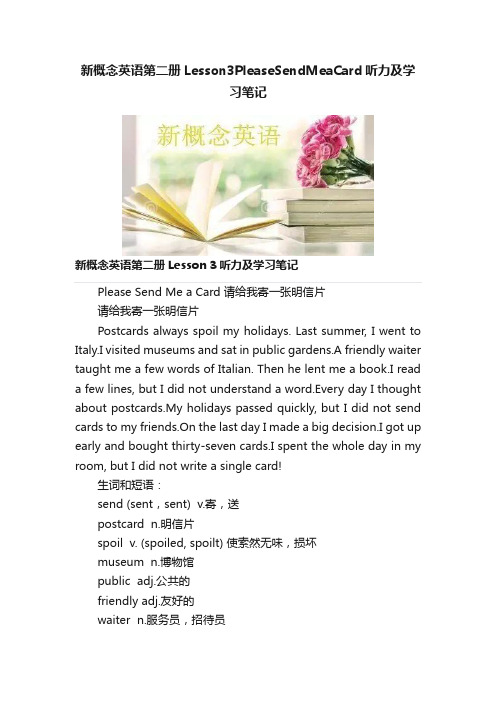
新概念英语第二册Lesson3PleaseSendMeaCard听力及学习笔记Please Send Me a Card 请给我寄一张明信片请给我寄一张明信片Postcards always spoil my holidays. Last summer, I went to Italy.I visited museums and sat in public gardens.A friendly waiter taught me a few words of Italian. Then he lent me a book.I read a few lines, but I did not understand a word.Every day I thought about postcards.My holidays passed quickly, but I did not send cards to my friends.On the last day I made a big decision.I got up early and bought thirty-seven cards.I spent the whole day in my room, but I did not write a single card!生词和短语:send (sent,sent) v.寄,送postcard n.明信片spoil v. (spoiled, spoilt) 使索然无味,损坏museum n.博物馆public adj.公共的friendly adj.友好的waiter n.服务员,招待员lend (lent, lent) v.借给decision n.决定whole adj.整个的single adj.唯一的,单一的知识点学习一、词汇讲解:1.send vt.寄,发送;传达,告知;派遣,打发send sb. sth.= send sth. to sb.例句:Tim sent me a postcard from England.send for sb. 请某人过来=ask sb. to come here例句:Please send for a doctor as quickly as you can.2.spoil v.破坏,毁掉;溺爱,宠爱其过去式和过去分词分别是spoiled和spoilt。
新概念英语第二册课后习题答案详解_1-40

新概念英语第二册课后习题答案详解Lesson 11. b选b最为正确。
因为a.d.都与课文内容不符合,也不合乎逻辑;c.的意思是“他们没有注意他”,而作者的意图并不是想让他们注意他,而是想让他们停止谈话。
所以选b. 最能表达作者当时心里的感受。
2.c其余3个答案都与原句意思不符合。
3.b因为a. to 不对,可以是He went to the theatre;c. into 也不对,可以是He went into the theatre;d. on更不符合语法,表示在某一个地方用介词in 或at, in 表示在大的空间,如国家,城市等,at 则表示在小的地点或空间,如atthe office, at the theatre 等, 所以选b.是正确的。
4.db. above(在……上方);c. ahead of (在……的前面,在……之前)不和behind 对应,也不强调位置的前后顺序。
a. before 和 d. infront of 都是和behind对应的,都有“在……前面”的意思。
但in front of 更具体的强调位置,而before则包含更宽泛的意思,即时间上,空间,次序,登记,重要性方面的“在……前面”5.c因为用a. Where, b. why, d. when 提问都不符合逻辑,都不是针对状态提问的,只有How提问,才能用Angry回答。
6.ab. they 只做主语;c. their只能做定语;d. us 虽然可以做宾语,但与前一句意思不符合。
7.da. none是代词,很少用在名词前面;b. any 只能用在否定句或疑问句中;c. not any 不符合语法,因为前面没有助动词did.8.ba. chair(椅子),c. armchair(手扶椅) d. class(班级) 这3个选择都和seat的意思不符合。
Seat是”座位,座席”的意思。
强调的是可供坐下的地方,不是具体的椅子。
新概念英语2unit3单词及讲解
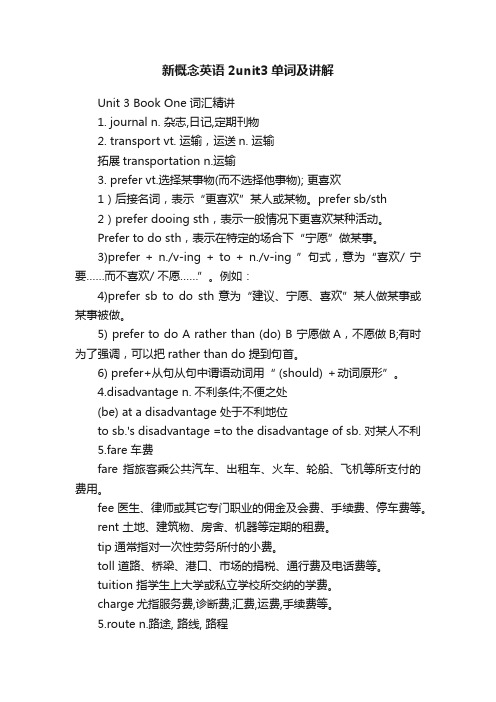
新概念英语2unit3单词及讲解Unit 3 Book One 词汇精讲1. journal n. 杂志,日记,定期刊物2. transport vt. 运输,运送n. 运输拓展transportation n.运输3. prefer vt.选择某事物(而不选择他事物); 更喜欢1)后接名词,表示“更喜欢”某人或某物。
prefer sb/sth2)prefer dooing sth,表示一般情况下更喜欢某种活动。
Prefer to do sth,表示在特定的场合下“宁愿”做某事。
3)prefer + n./v-ing + to + n./v-ing ”句式,意为“喜欢/ 宁要……而不喜欢/ 不愿……”。
例如:4)prefer sb to do sth意为“建议、宁愿、喜欢”某人做某事或某事被做。
5) prefer to do A rather than (do) B 宁愿做A,不愿做B;有时为了强调,可以把rather than do 提到句首。
6) prefer+从句从句中谓语动词用“ (should) +动词原形”。
4.disadvantage n. 不利条件;不便之处(be) at a disadvantage 处于不利地位to sb.'s disadvantage =to the disadvantage of sb. 对某人不利5.fare 车费fare 指旅客乘公共汽车、出租车、火车、轮船、飞机等所支付的费用。
fee 医生、律师或其它专门职业的佣金及会费、手续费、停车费等。
rent 土地、建筑物、房舍、机器等定期的租费。
tip通常指对一次性劳务所付的小费。
toll 道路、桥梁、港口、市场的捐税、通行费及电话费等。
tuition 指学生上大学或私立学校所交纳的学费。
charge尤指服务费,诊断费,汇费,运费,手续费等。
5.route n.路途, 路线, 路程6.flow n.流动, 流量vi流动, 流出flow into 流入a good flow of milk丰富的出奶量a flow of traffic车水马龙7.ever sinceever since从……以后,一直1)引导的时间状语从句中,主句用现在完成时,谓语动词通常要用一般过去时,且谓语动词要用延续性动词。
新概念第二册Lesson 3知识要点总结(1)
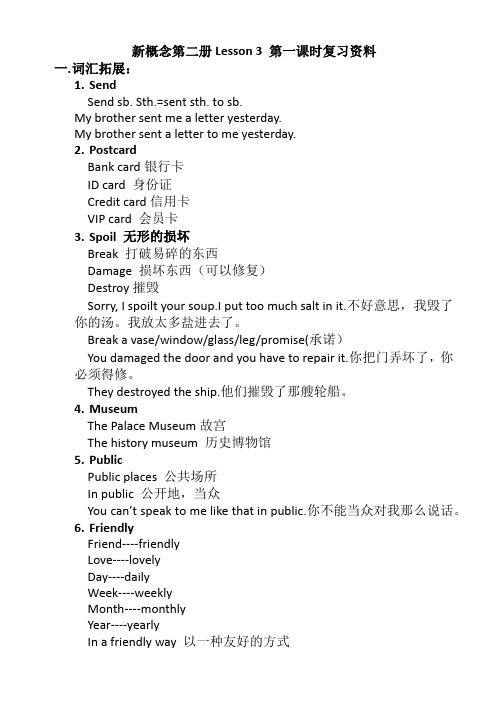
新概念第二册Lesson 3 第一课时复习资料一.词汇拓展:1.SendSend sb. Sth.=sent sth. to sb.My brother sent me a letter yesterday.My brother sent a letter to me yesterday.2.PostcardBank card银行卡ID card 身份证Credit card信用卡VIP card 会员卡3.Spoil 无形的损坏Break 打破易碎的东西Damage 损坏东西(可以修复)Destroy摧毁Sorry, I spoilt your soup.I put too much salt in it.不好意思,我毁了你的汤。
我放太多盐进去了。
Break a vase/window/glass/leg/promise(承诺)You damaged the door and you have to repair it.你把门弄坏了,你必须得修。
They destroyed the ship.他们摧毁了那艘轮船。
4.MuseumThe Palace Museum故宫The history museum 历史博物馆5.PublicPublic places 公共场所In public 公开地,当众You can’t speak to me like that in public.你不能当众对我那么说话。
6.FriendlyFriend----friendlyLove----lovelyDay----dailyWeek----weeklyMonth----monthlyYear----yearlyIn a friendly way 以一种友好的方式7.waiter----waitressActor----actress8.LendLend sb. Sth.=lend sth.to sb.Borrow sth. From sb.Tom lent me his car.=Tom lent his car to me.=I borrowed the car from Tom.=I borrowed Tom’s car.9.DecisionMake a big decision to do sth.Decide to do sth.He decided to go to Paris for his holiday.他决定去巴黎度假。
新概念成人版英语第二册unit3课件
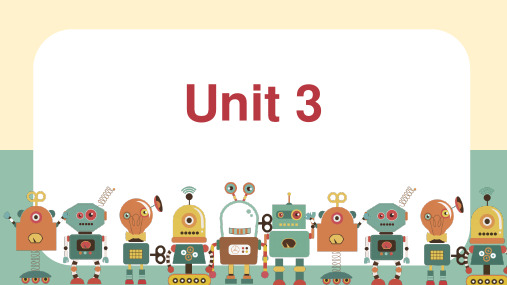
Every day I thought about postcards. My holiday passed quickly, but I did not send cards to my friends. On the last day I made a big decision. I got up early and boutht thirsty-seven cards.
一般过去时
概念
表示过去发生的动作或者状态
标志词 结构 动词变化
yesterday,last...;...ago
主+was/were+其他 主语+实义动词过去式+其他
动词过去式变化
Special Difficulties
He lent me a book.
He lent a book to me.
He:主语 lent:动词,谓语 me:宾语 book:宾语
spend 花费(时间,金钱): spend time/money on+名词 spend time/money (in) doing sth. I spent 3000 dollars on this painting single: single room 单人间
the whole+名词单数 整个.....
think about 考虑,思考 think of 想到 think over 反复思考:Think it over before you do it.
pass 指时间流逝
I spent the whole day in my room, but I did not write a single card.
Yes, I +动词过去式+some+名词复数+时间状语.
新概念第二册lesson3详解
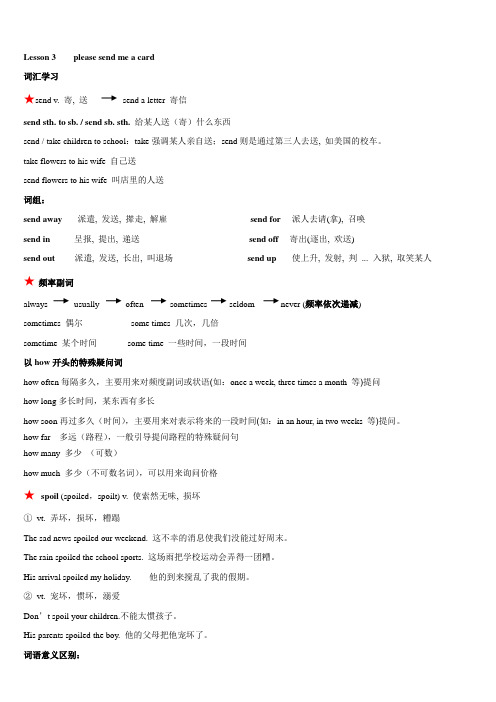
Lesson 3 please send me a card词汇学习★send v. 寄, 送send a letter 寄信send sth. to sb. / send sb. sth.给某人送(寄)什么东西send / take children to school:take强调某人亲自送;send则是通过第三人去送, 如美国的校车。
take flowers to his wife 自己送send flowers to his wife 叫店里的人送词组:send away派遣, 发送, 撵走, 解雇send for派人去请(拿), 召唤send in呈报, 提出, 递送send off寄出(逐出, 欢送)send out派遣, 发送, 长出, 叫退场send up使上升, 发射, 判... 入狱, 取笑某人★频率副词always usually often sometimes seldom never (频率依次递减)sometimes 偶尔some times 几次,几倍sometime 某个时间some time 一些时间,一段时间以how开头的特殊疑问词how often每隔多久,主要用来对频度副词或状语(如:once a week, three times a month等)提问how long多长时间,某东西有多长how soon再过多久(时间),主要用来对表示将来的一段时间(如:in an hour, in two weeks 等)提问。
how far 多远(路程),一般引导提问路程的特殊疑问句how many 多少(可数)how much 多少(不可数名词),可以用来询问价格★spoil (spoiled,spoilt) v. 使索然无味, 损坏①vt. 弄坏,损坏,糟蹋The sad news spoiled our weekend. 这不幸的消息使我们没能过好周末。
The rain spoiled the school sports. 这场雨把学校运动会弄得一团糟。
新概念英语第2册课程讲义Lesson3
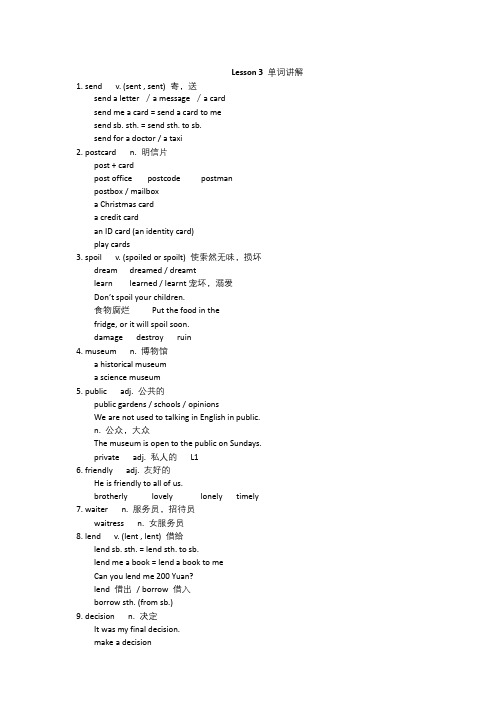
Lesson 3 单词讲解1. send v. (sent , sent) 寄,送send a letter /a message /a cardsend me a card = send a card to mesend sb. sth. = send sth. to sb.send for a doctor / a taxi2. postcard n. 明信片post + cardpost office postcode postmanpostbox / mailboxa Christmas carda credit cardan ID card (an identity card)play cards3. spoil v. (spoiled or spoilt) 使索然无味,损坏dream dreamed / dreamtlearn learned / learnt 宠坏,溺爱Don’t spoil your children.食物腐烂Put the food in thefridge, or it will spoil soon.damage destroy ruin4. museum n. 博物馆a historical museuma science museum5. public adj. 公共的public gardens / schools / opinionsWe are not used to talking in English in public.n. 公众,大众The museum is open to the public on Sundays.private adj. 私人的L16. friendly adj. 友好的He is friendly to all of us.brotherly lovely lonely timely7. waiter n. 服务员,招待员waitress n. 女服务员8. lend v. (lent , lent) 借给lend sb. sth. = lend sth. to sb.lend me a book = lend a book to meCan you lend me 200 Yuan?lend 借出/ borrow 借入borrow sth. (from sb.)9. decision n. 决定It was my final decision.make a decisiondecide v. 决定decide to do sth.I decided to go abroad for further education.10. whole adj. 整个的a whole day / weekA Whole New Worldwhole milk11. single adj. 唯一的,单一的a single bed / ticketLesson 3 课文&语法讲解1. 一般过去时形式:V.过去式(did)用法:Last summer I went to Italy.Mary and I __________ (talk) about your book hours ago.They __________ (have) a meeting yesterday.Tom __________ (be) a student when he was ten years old. 一般过去时形式:V.过去式(did)用法:Last summer I went to Italy.注意:She had a boyfriend.Tom was a student.一般过去式V.过去式(did)否定/疑问You were happy.You were not happy.Were you h appy?They had a meeting.They did not have a meeting.Did they have a meeting?一般过去式V.过去式(did)补充:V.原形V.过去式V.过去分词look looked looked teachtaguht taughtgo went gonewrite wrote written2. … I went…3. … I visited… and sat …4. A friendly waiter taught…5. … he lent…6. Then he lent me a book.= Then he lent a book t o me.主谓双宾She gave me a book. =?I cooked him a meal. =?He sold them all his flowers. =?Pass me the salt please. =?7. I read a few lines, but I did not understand…read read readunderstand understood understood8. Every day I thought about…every day / everyday9. I got up early and bought…get got got/gottenget up early/late stay up latebuy bought bought10. I spent the whole day in my room…spend time / money + on sth./(in) doing sth.Lesson 3 知识拓展1. spoil 超纲词汇2. public adj. / n. 都在考纲范围一般过去时怎么考?1 过去的时间2 过去的动作(时态)3 上下文的语意(无过去)The three of us ______ around Europe for about a month last summer.A. travelledB. have travelledC. had travelledD. travel( 天津12)The three of us ______ around Europe for about a month last summer.A. travelledB. have travelledC. had travelledD. travel( 天津12)-Did you ask Sophia for help?-I ______ need to – I managed perfectly well on my own.A. wouldn’tB. don’tC. didn’tD. won’t( 全国14)-Did you ask Sophia for help?-I ______ need to – I managed perfectly well on my own.A. wou ldn’tB. don’tC. didn’tD. won’t( 全国14)I was out of town at the time, so I don’t know exactly how it ______.A. was happeningB. happenedC. happensD. has happened( 山东34)I was out of town at the time, so I don’t know exactly how it ______.A. was happeningB. happenedC. happensD. has happened( 山东34)When I got on the bus, I ______ I had left my wallet at home.A. was realizingB. realizedC. have realizedD. would realize( 山东31)When I got on the bus, I ______ I had left my wallet at home.A. was realizingB. realizedC. have realizedD. would realize( 山东31)-Kevin, you look worried. Anything wrong?-Well, I ______ a test and I’m waiting for the result.A. will takeB. tookC. had takenD. take( 重庆22)If you don’t like the drink you ______, just leave it and try a different one.A. orderedB. are orderingC. will orderD. had ordered( 全国9)-What do you think of the movie?-It’s fantastic. The only pity is that I ______ the beginning of it.A. missedB. had missedC. missD. would miss( 浙江20)。
(完整word版)新概念英语第二册课后习题答案详解and单元测试答案(全)

新概念英语第二册课后习题答案详解Lesson 11。
b选b最为正确。
因为a。
d。
都与课文内容不符合,也不合乎逻辑;c.的意思是“他们没有注意他”,而作者的意图并不是想让他们注意他,而是想让他们停止谈话。
所以选b. 最能表达作者当时心里的感受。
2.c其余3个答案都与原句意思不符合.3.b因为a. to 不对,可以是He went to the theatre;c. into 也不对,可以是He went into the theatre;d。
on 更不符合语法,表示在某一个地方用介词in 或at, in 表示在大的空间,如国家,城市等,at 则表示在小的地点或空间,如atthe office, at the theatre 等, 所以选b.是正确的.4.db。
above(在……上方);c。
ahead of (在……的前面,在……之前)不和behind 对应,也不强调位置的前后顺序。
a. before 和 d. infront of 都是和behind对应的,都有“在……前面”的意思.但in front of 更具体的强调位置,而before则包含更宽泛的意思,即时间上,空间,次序,登记,重要性方面的“在……前面”5.c因为用 a. Where, b. why, d. when 提问都不符合逻辑,都不是针对状态提问的,只有How提问,才能用Angry回答.6.ab。
they 只做主语; c. their只能做定语;d. us 虽然可以做宾语,但与前一句意思不符合.7.da. none是代词,很少用在名词前面;b。
any 只能用在否定句或疑问句中;c。
not any 不符合语法,因为前面没有助动词did。
8。
ba. chair(椅子), c。
armchair(手扶椅) d. class(班级) 这3个选择都和seat的意思不符合。
Seat 是”座位,座席”的意思. 强调的是可供坐下的地方,不是具体的椅子。
新概念第二册3
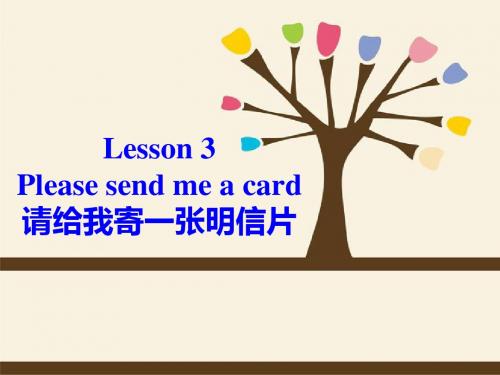
• • • • • •
friendly ['frendli] waiter ['weitə] lend [lend] decision [di'siʒən] whole [həul] single ['siŋgəl]
a.友好的 n.服务员,招待员 v.借给 n.决定 a.整个的 a.唯一的,单一的
First listen and then answer the question.
New words and expressions
• send [send] • spoil [spɔil] v.寄,送 v.使索然无味,损坏 n.博物馆 a.公共的 • postcard ['pəustkɑ:d] n.明信片 • museum [mju:'ziəm] • public ['pʌblik]
send /send/
• • • • • • send sth. to sb. / send sb. sth send a letter 寄信 类似的用法还有 give, take, pass, read, sell... send / take children to school send / take 区别: take 强调某人亲自送;send 则是通过第三 人去送,如美国的校车。 • Tom’s father sends him to school every day. • Mary took her son to school yesterday.
这条小狗被宠坏了, 每天到处小便. piss
★public
• • • • • • •
adj. 公共的
① adj. 公共的,公众的,社会的 There is a public library in this town. I always sit in public gardens on Sundays. public house(酒吧)简称 pub public place 公共场所 ② adj. 公开的,众人皆知的 Their secret meeting was made public 20 years later. 他们的秘密会晤20年以后才被公开。
新概念英语第二册第三课讲解

Lesson 3 Please send me a card请给我寄一张明信片Postcards always spoil my holidays. Last summer, I went to Italy. I visited museums and sat in public gardens. A friendly waiter taught me a few words of Italian. Then he lent me a book. I read a few lines, but I did not understand a word. Everyday I thought about postcards. My holidays passed quickly, but I did not send cards to my friends. On the last day I made a big decision. I got up early and bought thirty-seven cards. I spent the whole day in my room, but I did not write a single card!New words and expressions 生词和短语send v. 寄,送postcard n. 明信片spoil v. 使索然无味,损坏museum n. 博物馆public adj. 公共的friendly adj. 友好的waiter n. 服务员,招待员lend v. 借给decision n. 决定whole adj. 整个的single adj. 唯一的,单一的参考译文明信片总搅得我假日不得安宁。
去年夏天,我去了意大利。
我参观了博物馆,还去了公园。
一位好客的服务员教了我几句意大利语,之后还借给我一本书。
我读了几行,但一个字也不懂。
(完整版)新概念英语第二册第三课(包含课文及完整课后练习)(可编辑修改word版)
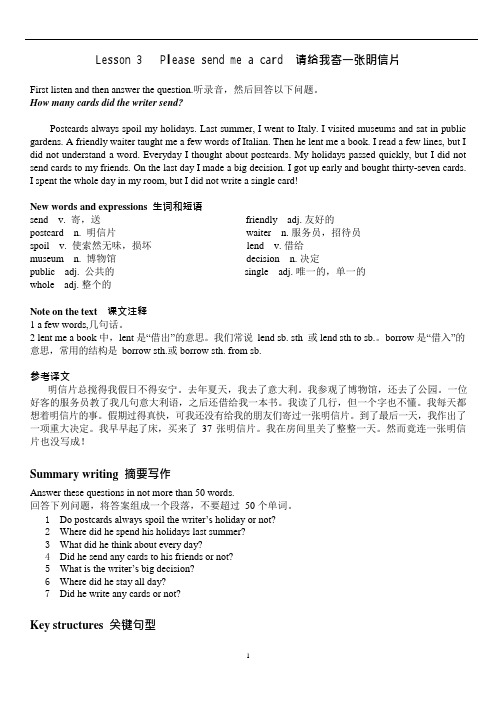
L e ss o n3P l e a s e s e n d m e a c a r d请给我寄一张明信片First listen and then answer the question.听录音,然后回答以下问题。
How many cards did the writer send?Postcards always spoil my holidays. Last summer, I went to Italy. I visited museums and sat in public gardens. A friendly waiter taught me a few words of Italian. Then he lent me a book. I read a few lines, but I did not understand a word. Everyday I thought about postcards. My holidays passed quickly, but I did not send cards to my friends. On the last day I made a big decision. I got up early and bought thirty-seven cards.I spent the whole day in my room, but I did not write a single card!New words and expressions 生词和短语send v. 寄,送friendly adj. 友好的postcard n. 明信片waiter n. 服务员,招待员spoil v. 使索然无味,损坏lend v. 借给museum n. 博物馆decision n. 决定public adj. 公共的single adj. 唯一的,单一的whole adj. 整个的Note on the text 课文注释1a few words,几句话。
新概念英语第二册Lesson-3-Please-send-me-a-card分析解析
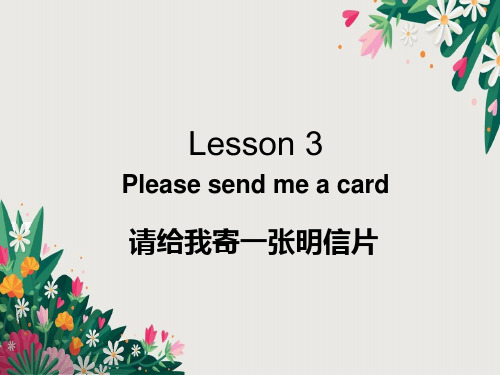
take和send的区分: take 强调某人亲自送 send则是通过第三人去送,如校车 take flowers to his wife 自己送 send flowers to his wife 叫店里的人送 类似的用法还有give,take,pass,read,sell...
• 本课重点:双宾语 • 双宾语指干脆宾语(表示动作结果)和间接宾语(表示动作目标) • 如在give sb sth中,sb是间接宾语,sth是干脆宾语
留意重音:Italy, Italian
post=letters post office, postman, postcard~~
waiter和waitress actor和actress
A friendly waiter taught me a few words of Italian.
Then he lent me a book.
holiday.
4. lend (lent,lent) v. 借给 lend to / lend out(借出) lend sth. to sb / lend sb. sth.
eg. A: Can you lend me $20 please? B: I’ll pay/give it back tomorrow.
friend n. 挚友 close friends 密友 bosom friend 知己 boy friend girl friend
make friends with sb 和某人交挚友 A friend in need is a friend indeed. 患难挚友才是真的挚友。
9. single
词一旦要加名词,前面确定要加the
all of us;all of the students
新概念英语第二册+Lesson+3+Please+send+me+a+card+知识点
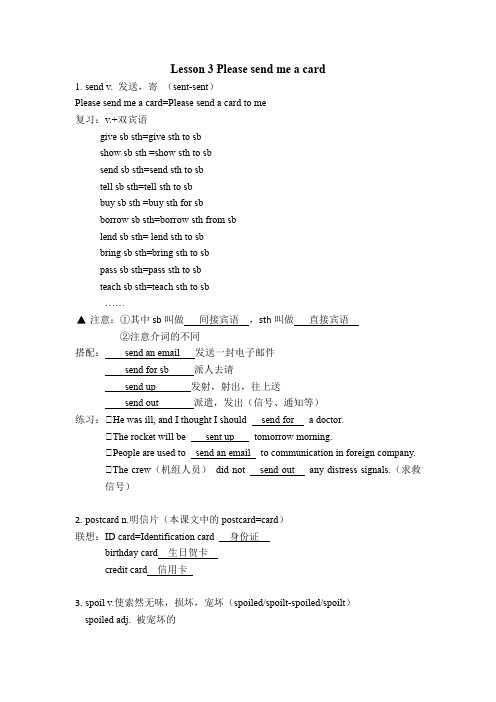
Lesson 3 Please send me a card1.send v. 发送,寄(sent-sent)Please send me a card=Please send a card to me复习:v.+双宾语give sb sth=give sth to sbshow sb sth =show sth to sbsend sb sth=send sth to sbtell sb sth=tell sth to sbbuy sb sth =buy sth for sbborrow sb sth=borrow sth from sblend sb sth= lend sth to sbbring sb sth=bring sth to sbpass sb sth=pass sth to sbteach sb sth=teach sth to sb……注意:①其中sb叫做间接宾语,sth叫做直接宾语②注意介词的不同搭配:send an email 发送一封电子邮件send for sb 派人去请send up 发射,射出,往上送send out 派遣,发出(信号、通知等)练习:①He was ill, and I thought I should send for a doctor.①The rocket will be sent up tomorrow morning.①People are used to send an email to communication in foreign company.①The crew(机组人员)did not send out any distress signals.(求救信号)2.postcard n.明信片(本课文中的postcard=card)联想:ID card=Identification card 身份证birthday card 生日贺卡credit card 信用卡3.spoil v.使索然无味,损坏,宠坏(spoiled/spoilt-spoiled/spoilt)spoiled adj. 被宠坏的注意:在英文中,现在分词(v-ing)和过去分词(done)可以作adj.修饰名词例:an interesting book一本有趣的书boiled water开水运用:Heavy rain has spoiled/spoilt my holiday.(动词过去分词)That spoiled boy always asks for everything.(过去分词作形容词)辨析:表示“损坏”的单词spoil damage destroy breakspoil 表示破坏心情,宠坏damage 强调损害后还可以修复destroy 强调损坏之后不能修复,彻底破坏break 强调“打破,打碎”练习:①After the air crash, the plane has been destroyed .①One of the visitors damaged our piano, and my dad would have it repaired.①Much homework will spoil my weekend.①Don’t break the vase.4.museum n.博物馆搭配:science museum 科学博物馆art museum 艺术博物馆history museum 历史博物馆5.friendly adj. 友好的;友善的联想:unfriendly 不友好的;不友善的friend 朋友friendship友谊运用:A friendly waiter taught me a few words of Italian.复习:n.+ly →adj.day→daily 日常的week→weekly 每周的year→yearly 每年的6.waiter n.服务员,招待员联想:waitress n.女服务员actor n.男演员/actress n.女演员host n.男主人,男主持人/hostess n.女主人,女主持人7.lend v.借给,借出(lent-lent)搭配:lend sb sth=lend sth to sb运用:He lent me a book.= He lent a book me .辨析:lend和borrowlend 表示借出去,句式是lend sb sth = lend sth to sbborrow 表示借进来,借入,句式是borrow sb sth=borrow sth from sb运用:He wanted to borrow money from me, but I didn’t lend it to him. (他想借钱,但是我没借给他)8.decision n.决定搭配:make a decision to do sth决定做某事例句:I make a decision to study hard. 我下定决心努力学习词根:decide v.决定(decided-decided)decide to do sth决定做某事例句:He decided to give me a hand.拓展:make up one’s mind to do sth.例句:Mr. Wang made up his mind to give up smoking.9.whole adj. 整个的搭配:the whole day=all the day=all day 一整天运用:the whole world 整个世界同音词:hole 洞,孔例句:He fell down the hole with carelessness.运用:dig a hole 挖洞10.single adj.唯一的,单一的,单身的搭配:single room 单人房联想:double adj.双的double room 双人房married adj. 已婚的运用:Are you single or married?I did nor even write a single card.我甚至一张卡片都没有写出来11.line n. 行,也可以表示路线,队列例句:I am repairing your telephone line. 我在修理你的电话线.The line is busy. 线路很忙Stand in the line. 排队12.a few, few, a little, little的用法①a few / few 后+ 可数名词a few 表示“有几个”,表达肯定含义few 表示“几乎没有”,表达否定含义(相当于no)②a little / little 后+ 不可数名词a little 表示“少量”,表达肯定含义little表示“几乎没有”,表达否定含义(相当于no)练习:① There are a few books in the box, and I will take out one to read.① The milk smells spoiled, and I will go to the market to buy a little .① There is a little/little water in the bottles.13.think v. 思考,考虑(thought-thought)think of vs think aboutthink of 想到,考虑,侧重于想起来,记起来think about 考虑,思索,侧重于认真思考,思索练习:①Think about it before you give your idea.①I know that guy, but I just can’t think of his name.14.on the last day 在最后一天on the first day 在第一天具体某一天用介词on练习:① in spring① on a cool autumn night① at noon/night① in June, 2004① on 1st June, 2024① on holiday15.spend v.(spent-spent)花费,度过搭配:spend sth 花费……(spend money 花钱)spend time/money on sthspend time/money (in) doing sth练习:He spends half an hour on English each day.He spends half an hour (in) learning (learn) English each day.16.时态复习:一般过去时一、定义:一般过去时用来表示过去某一时间内发生的动作或存在的状态以及过去习惯性、反复性的动作二、动词构成:was/were 或者动词过去式※注意:复习背诵动词过去式不规则变化表三、句型转换1.be动词的变化肯定句:主语+was/were+其他否定句:主语+was/were+not+其他+?一般疑问句:Was/Were+主语+其他+?特殊疑问句:特殊疑问词+was/were+主语+其他+?2.行为动词的变化肯定句:主语+动词过去式+其他否定句:主语+didn’t+动词原型+其他一般疑问句:Did+主语+动词原型+其他+?特殊疑问句:特殊疑问词+did+主语+动词原型+其他+?四、连用的时间状语yesterday, the day before yesterday, last+时间,时间+ago, just now, in 1990, at the age of ...,When I was 8...,this morning, that day, in those days等。
新概念英语第二册课后习题答案详解

新概念英语第二册课后习题答案详解Lesson 11. b 选 b 最为正确。
因为 a.d.都与课文内容不符合,也不合乎逻辑; c.的意思是“他们没有注意他”,而作者的意图并不是想让他们注意他,而是想让他们停止谈话。
所以选 b. 最能表达作者当时心里的感受。
2. c 其余 3 个答案都与原句意思不符合。
3. b 因为 a. to 不对,可以是He went to the theatre;c. into也不对,可以是He went into the theatre;d. on 更不符合语法,表示在某一个地方用介词in 或 at, in 表示在大的空间,如国家,城市等,at 则表示在小的地点或空间,如atthe office, at the theatre 等, 所以选 b.是正确的。
4. db. above(在上方 ); c. ahead of ( 在的前面,在之前)不和 behind 对应,也不强调位置的前后顺序。
a. before 和 d. infront of都是和behind对应的,都有“在前面” 的意思。
但in front of更具体的强调位置,而before 则包含更宽泛的意思,即时间上,空间,次序,登记,重要性方面的“在前面”5. c 因为用 a. Where, b. why, d. when 提问都不符合逻辑,都不是针对状态提问的,只有How 提问,才能用 Angry 回答。
6. ab. they 只做主语; c. their 只能做定语; d. us 虽然可以做宾语,但与前一句意思不符合。
7. da. none 是代词,很少用在名词前面; b. any 只能用在否定句或疑问句中; c. not any 不符合语法,因为前面没有助动词did.8.ba. chair(椅子 ), c. armchair( 手扶椅 ) d. class(班级 ) 这 3 个选择都和seat 的意思不符合。
沪江网新概念第二册单元测试三讲解
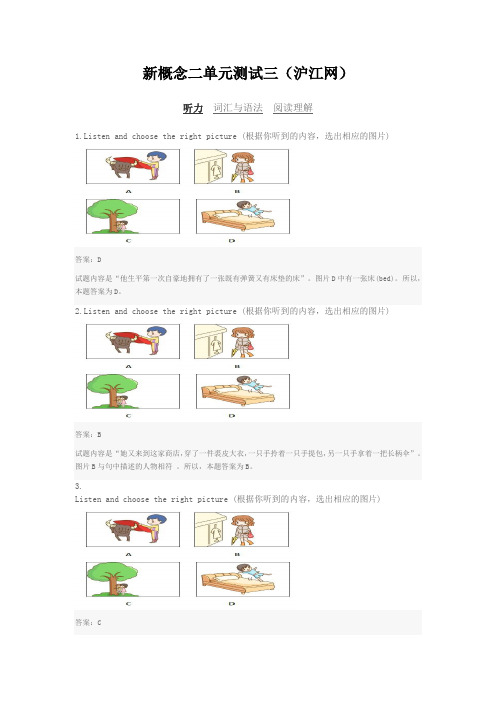
新概念二单元测试三(沪江网)听力词汇与语法阅读理解1.Listen and choose the right picture (根据你听到的内容,选出相应的图片)答案:D试题内容是“他生平第一次自豪地拥有了一张既有弹簧又有床垫的床”。
图片D中有一张床(bed)。
所以,本题答案为D。
2.Listen and choose the right picture (根据你听到的内容,选出相应的图片)答案:B试题内容是“她又来到这家商店,穿了一件裘皮大衣,一只手拎着一只手提包,另一只手拿着一把长柄伞”。
图片B与句中描述的人物相符。
所以,本题答案为B。
3.Listen and choose the right picture (根据你听到的内容,选出相应的图片)答案:C试题内容是“尽管上述种种说法,但游客们还是照常摘树叶并把他们的名字刻在树干上”。
图片C中有一棵大树,两小朋友在树干上刻字。
所以,本题答案为C。
4.Listen and choose the right picture (根据你听到的内容,选出相应的图片)答案:A试题内容是“当时那公牛正忙于对付斗牛士,但突然它看见了醉汉,只见他大声说着粗鲁的话,手里挥动着一顶红帽子”。
图片A中是斗牛士和公牛。
所以,本题答案为A。
5.Listen to the dialogue and choose the best answer to the question you hear (根据你听到的对话和问题,选出最恰当的答案)•The man can speak a foreign language.•The woman hopes to improve her English.•The woman knows many different languages.•The man wishes to visit many more countries.答案:The man can speak a foreign language.解析:问题为询问从对话中我们学到什么。
新概念英语第二册第三课最全讲义
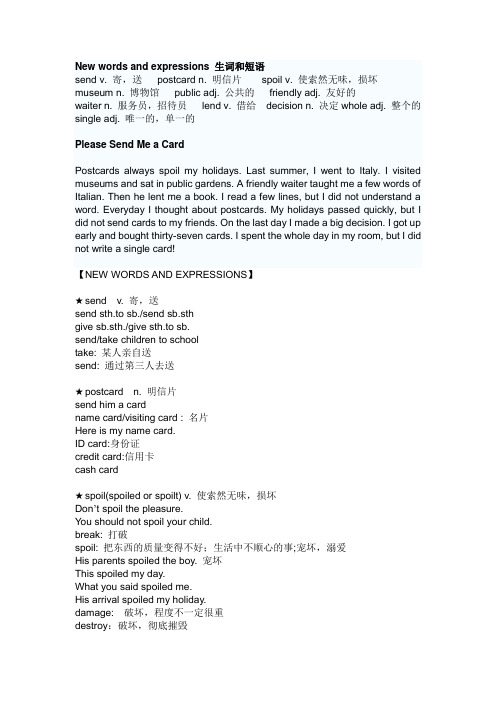
New words and expressions 生词和短语send v. 寄,送postcard n. 明信片spoil v. 使索然无味,损坏museum n. 博物馆public adj. 公共的friendly adj. 友好的waiter n. 服务员,招待员lend v. 借给decision n. 决定whole adj. 整个的single adj. 唯一的,单一的Please Send Me a CardPostcards always spoil my holidays. Last summer, I went to Italy. I visited museums and sat in public gardens. A friendly waiter taught me a few words of Italian. Then he lent me a book. I read a few lines, but I did not understand a word. Everyday I thought about postcards. My holidays passed quickly, but I did not send cards to my friends. On the last day I made a big decision. I got up early and bought thirty-seven cards. I spent the whole day in my room, but I did not write a single card!【NEW WORDS AND EXPRESSIONS】★send v. 寄,送send sth.to sb./send sb.sthgive sb.sth./give sth.to sb.send/take children to schooltake: 某人亲自送send: 通过第三人去送★postcard n. 明信片send him a cardname card/visiting card : 名片Here is my name card.ID card:身份证credit card:信用卡cash card★spoil(spoiled or spoilt) v. 使索然无味,损坏Don’t spoil the pleasure.You should not spoil your child.break: 打破spoil: 把东西的质量变得不好;生活中不顺心的事;宠坏,溺爱His parents spoiled the boy. 宠坏This spoiled my day.What you said spoiled me.His arrival spoiled my holiday.damage: 破坏,程度不一定很重destroy:破坏,彻底摧毁★museum n. 博物馆Palace Museum:故宫★public adj. 公共的privatepublic school/place/house(pub:酒吧)in private: 私下里的in public: 公开的Why not have a conversation in public?★ Park 比较大Garden比较具有观赏价值,有不同风格的花园如Spanish garden,Italian garden private garden私家花园★friendly adj. 友好的lovely adj.★waiter n. 服务员,招待员waiterwaitresschief waitershop assistantattendant★ a few words 几句话I’d like to say a few words on the topic.Can I have a word with you? Have a word with sb是固定搭配,和某人说句话★lend v. 借给borrow from 向某人借lend sth.to sblend sb.sth.Can I borrow some money from you?Some people neither borrow nor lend.★decision n. 决定v. decidemake a big/great decisioncome to a decision, arrive at a decision, reach a decision★whole adj. 整个的all the...the whole...★single adj. 唯一的,单一的DoubleThere wasn’t a single person on the beach.【课文讲解】The baby spoiled my night.Italian/Italy 意大利语意大利England English 英语French法语France法国German德语Germany德国Japanese日语Japan日本Spain西班牙Spanish西班牙语and 先后往往是对等的概念teach sb.sth.a little ItalianI can speak a little English/a few words of Englishthink about: 考虑,思考think over : 仔细考虑last:表示"上一个"或"最后一个",表示"最后一个"时要加冠词theI spend the whole day in my room.spend+时间+地点I spend three hours in the sea.I spend my weekend at my mother's.I spend three hours in the classroom everyday.I spend a lot of time in traffic jam.reviewspoilsend/lend/teach sb.sth.send/lend/teach sth. to sb【Special Difficulties】翻译:1.他借了一本书给我。
新概念英语第二册第3-4课讲解

新概念英语第二册第3-4课讲解3-4课单词send[send]v.寄,送双宾结构:I want to send a gift to my mother.=I want to send my mother a gift.I will send you a mail to confirm it.我会发封邮件给你来确认此事.postcard['pustkɑ:d]n.明信片t不发音Play cards 打牌spoil[spil]v.使索然无味,损坏spoil-spoiled / spoilt 也能够翻译为 v.溺爱Spare the rod; spoil the child.孩子不打不成器( Spare v.使……闲置 rod n. 棒/棍)spare part 备件 oil 油in the book 印/写在书上 on the book 放在书上museum[mju:'zim] n.博物馆We visited a museum yesterday.我们昨天去参观了博物馆public['pblik]a.公共的private ['praivit] a.私人的In private 私底下(private在此为名词)In public 公众/共场合(public在此为名词)friendly['frendli]a.友好的make friends 交朋友I like/love making friends.我喜欢交朋友.(like后接动词时,只能接to do (不定式)或接doing(动名词))waiter['weit]n.服务员,招待员wait 等待A:Wait a moment等一下B:What’s up?/What’s wrong?/Anything wrong?怎么了?waitress 女服务员(female 女性)waiter 服务员(能够是male男性或female 女性)lend[lend]v.借给borrow 借进 borrow sb. Sth. He borrowed my car.他借了我的车borrow sth. from sb.lend 借出(双宾结构) lend sb. Sth. I lent him my car.我把我的车借给了他lend sth. to sb.decision[di'sin]n.决定It’s up to you/her/him/them/Gordon!你/她/他/他们/Gordon 决定.to 后接动词原形是不定式to后接的不为动词原形则是介词,介词后接宾格,称为介宾结构.make a decision 做决定A:It’s hard for me to make this decision.作出这个决定好难哦!(to后接动词原形,是不定式)B:I understand.我理解.10whole[hul]a.整个的hole 孔,洞all morning =the whole morning 整整一个上午all day=the whole day 整整一天11single['sigl]a.的,单一的Are you single.你单身吗?Are you married?你婚了吗?unmarried 未婚married 已婚singer 歌手12exciting[ik'saiti]a.令人兴奋的An exciting trip 激动人心的旅行a 一… (用于辅音音标前)an 一….(用于元音音标前) An hour 一个小时 An FCI factory 主语为人 excited tired bored embarrassed主语为物/事exciting tiring boring embarrassingA:How was your holiday?你的假期怎么样?B:It was tiring. 很累.This is an exciting trip.这是一次激动人心的旅行.This film/movie is very exciting.这电影非常刺激.A:How was your trip?你的旅行怎么样?B:It was tiring but meaningful.很累但是很有意义.This book is boring.这本书很无聊.Everybody is very excited.每个人都很兴奋.I feel a little bored.我觉得有点无聊.I was very tired this morning.今天上午我非常累.13receive[ri'si:v]v.接收,收到I have received your gift, but I can’t accept it.我收到了你的礼物,但是我不能接受.I accept your apology.我接受你的道歉.Have you received it?你收到了吗?Accept接受,receive收到/接收14firm[f:m]n.商行,公司Please confirm it ASAP!请尽快确认.(ASAP=as soon as possible尽快)Do you work in this firm?你在这家公司工作吗?I work in this firm.我在这家公司工作.15different['difrnt]a.不同的We are different. 我们不一样。
- 1、下载文档前请自行甄别文档内容的完整性,平台不提供额外的编辑、内容补充、找答案等附加服务。
- 2、"仅部分预览"的文档,不可在线预览部分如存在完整性等问题,可反馈申请退款(可完整预览的文档不适用该条件!)。
- 3、如文档侵犯您的权益,请联系客服反馈,我们会尽快为您处理(人工客服工作时间:9:00-18:30)。
新概念二单元测试三(沪江网)听力词汇与语法阅读理解1.Listen and choose the right picture (根据你听到的内容,选出相应的图片)答案:D试题内容是“他生平第一次自豪地拥有了一张既有弹簧又有床垫的床”。
图片D中有一张床(bed)。
所以,本题答案为D。
2.Listen and choose the right picture (根据你听到的内容,选出相应的图片)答案:B试题内容是“她又来到这家商店,穿了一件裘皮大衣,一只手拎着一只手提包,另一只手拿着一把长柄伞”。
图片B与句中描述的人物相符。
所以,本题答案为B。
3.Listen and choose the right picture (根据你听到的内容,选出相应的图片)答案:C试题内容是“尽管上述种种说法,但游客们还是照常摘树叶并把他们的名字刻在树干上”。
图片C中有一棵大树,两小朋友在树干上刻字。
所以,本题答案为C。
4.Listen and choose the right picture (根据你听到的内容,选出相应的图片)答案:A试题内容是“当时那公牛正忙于对付斗牛士,但突然它看见了醉汉,只见他大声说着粗鲁的话,手里挥动着一顶红帽子”。
图片A中是斗牛士和公牛。
所以,本题答案为A。
5.Listen to the dialogue and choose the best answer to the question you hear (根据你听到的对话和问题,选出最恰当的答案)•The man can speak a foreign language.•The woman hopes to improve her English.•The woman knows many different languages.•The man wishes to visit many more countries.答案:The man can speak a foreign language.解析:问题为询问从对话中我们学到什么。
女士对男士说你访问了这么多国家,你一定能说几种不同的语言,男士说“I wish I could. But Japanese and, of course English are the only languages I can speak.”可知男士只会说日语和英语,其中日语是他会说的外语。
所以,本题答案为The man can speak a foreign language。
6.Listen to the dialogue and choose the best answer to the question you hear (根据你听到的对话和问题,选出最恰当的答案)•Go to the library.•Meet the woman.•See Professor Smith.•Have a drink in the bar.答案:See Professor Smith解析:问题为询问这位男士课后首先做什么。
男士说“Professor Smith asked me to go to his office after class.So it’s impossible for me to make it to the bar at ten.”可知他课后首先要去见Smith教授。
所以,本题答案为See Professor Smith。
7.Listen to the dialogue and choose the best answer to the question you hear (根据你听到的对话和问题,选出最恰当的答案)•She isn't sure when Professor Bloom will be back.•The man shouldn't be late for his class.•The man can come back sometime later.•She can pass on the message for the man.答案:She can pass on the message for the man.解析:问题为询问这位女士是什么意思。
由对话中“You can just leave a note. I’ll give it to her later.”可知女士会把便条交给Bloom教授。
所以,本题答案为D。
8.Listen to the dialogue and choose the best answer to the question you hear (根据你听到的对话和问题,选出最恰当的答案)•He has a strange personality.•He's got emotional problems.•His illness is beyond cure.•His behaviour is hard to explain.答案:He's got emotional problems.解析:问题为询问从这个对话中我们得知John怎么了。
女士说“It still seems impossible to make him smile.Talking to him is really difficult and he gets upset easily over little things.”可知John的情绪有问题。
所以,本题答案为He's got emotional problems。
9.Listen to the dialogue and choose the best answer to the question you hear (根据你听到的对话和问题,选出最恰当的答案)•He turned suddenly and ran into a tree.•He was hit by a fallen box from a truck.•He drove too fast and crashed into a truck.•He was trying to overtake the truck ahead of him.答案:He turned suddenly and ran into a tree.解析:问题为询问关于出租车司机我们得知什么。
男士说这位出租车司机一定超速了,女士说“Well, not really.He crashed into the tree because he was trying not to hit a box that had fallen off the truck ahead of him.”司机为了躲避他前面卡车掉下来的箱子而撞树上了。
所以,本题答案为He turned suddenly and ran into a tree。
1.Choose the best answer (选择最恰当的答案)That evening __the___ Greens sat before a bright fire and had __a___ nice supper.the…a/…//…athe…/答案:the…a本题考查定冠词和不定冠词的用法。
定冠词加“姓”再加“S”结构表示“一家人”;supper前有nice修饰,此处要用不定冠词a。
所以正确答案是the…a。
2.I'll ring you up __as soon as__ I got an answer from him.as soon asuntilbeforebecause答案: as soon as本题考查引导时间状语从句的从属连词。
as soon as(一……就……),用于引导时间状语从句。
正确答案是as soon as。
3.Betty, let's make a cake _with___ some flour, sugar, butter and milk.atofinwith答案: with本题考查介词的用法。
with意为“用,凭借”。
所以,正确答案是with。
4.— I saw you come to school by bus this morning.— Oh, I _______ come to school by bus, but it is raining today.hardlyalwayssometimesusually答案:hardly本题考查副词辨析。
根据题意,我几乎不坐车,不过今天下雨了。
hardly“几乎不”,always“总是”,sometimes“有时”,usually“经常”。
故选hardly。
5.Tom ought not to _have told__ me your secret, but he meant no harm.have toldtellbe tellinghaving told答案:have told 本题考查情态动词ought to。
由于后句为过去时,告诉秘密的动作又发生在其前面,此处应用过去完成时,但它在情态动词ought to后,所有用have。
故选have told。
6.Mum, today is Mother's Day. Mike and I want to invite you to have dinner __with__ us at Shanghai Restaurant, which is famous __for_____ its seafood.with; ofwith; forfor; toto; for答案:with; for本题考查介词的固定搭配。
with“和……一起”,be famous for“以……著称”。
正确答案是with; for。
7.If I __did__ the job, I would do it in a different way.would dodoshall dodid答案:did本题考查虚拟语气。
从句意我们能够看出叙述的是与现在事实相反的情况:其结构为:从句 - did / were, 主句 - would do,表示与现在事实相反的假设。
所以,本题答案为did。
译文:如果我做这份工作,我会用一种不同的方式。
8.— What's the price of petrol these days?— Oh, it _has risen__ sharply since last month.is raisedhas risenhas arisenis increased答案:has risen本题考查现在完成时。
